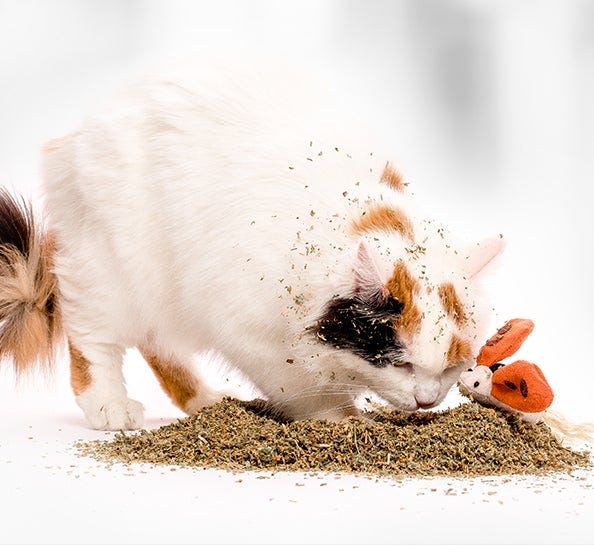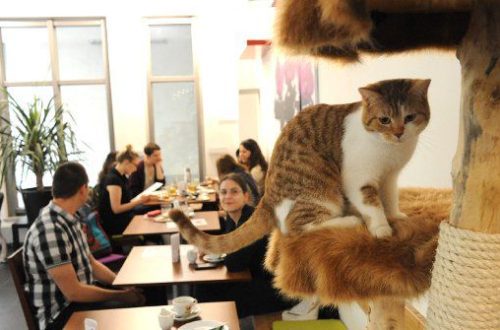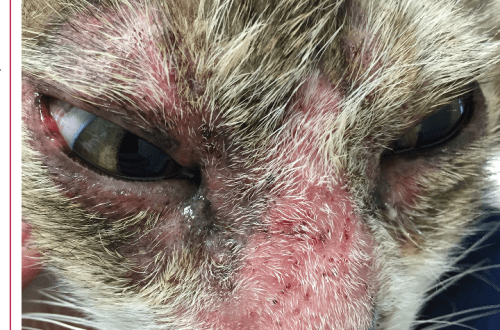
Can cats eat catnip?
Catnip – what kind of plant is it? Why do some cats literally go crazy when they smell it, while others are completely indifferent to it? What effect does mint have on pets? Is she safe? You will find the answers to all these questions in our article.
Catnip is a perennial herbaceous plant of the European-Central Asian species. It is found in Russia, Western and Central Asia, Central and Southern Europe, India, Nepal and Pakistan. Grows on forest edges, wastelands, along roads. Many grow an unpretentious plant in front gardens or at home.
The official name of catnip is catnip (lat. N? peta cat? ria). Obviously, the plant owes its name to the amazing effect on most cats, both domestic and wild. However, catnip is mainly used in areas far from the pet industry: medicine, cooking and perfumery.
The reason for the indifferent attitude of cats to catnip is the essential oil nepetalactone. Its content in the plant is approximately 3%. Nepetalactone has a rich aroma similar to lemon. This fragrance acts like a pheromone on cats and attracts at the genetic level. The wild panther feels the same delight from the catnip as the plush domestic Briton.
From the aroma of catnip, the cat changes dramatically in behavior. She forgets about pranks and noble feline immunity: she becomes incredibly affectionate, begins to purr, roll on the floor, rub against the source of the aroma, tries to lick it and eat it.
Many cats stretch to their full height and take sweet naps. Hyperactive cats relax and calm down, and indifferent couch potatoes, on the contrary, come to life and become curious.
Such euphoria lasts 10-15 minutes. Then the pet comes to its senses and for some time loses interest in the plant.
It is believed that catnip acts like a pheromone on cats. To one degree or another, it causes an imitation of sexual behavior, but not all cats are sensitive to it.
Kittens up to 6 months (that is, before puberty) are indifferent to the aroma of the plant. Approximately 30% of adult cats also do not react to catnip, and this is completely normal. Sensitivity to the plant, as a rule, is inherited. If your kitten’s mom or dad loved catnip, then he, having matured, is likely to follow their example.
In nature, there is another plant to which cats are not indifferent. This is Valerian officinalis, also known as “cat grass”, “cat root” or “meow grass”.
Valerian is used to prepare medicines for nervous tension and sleep disorders. But these drugs are for people, not for cats!
Ask any veterinarian and they will tell you that cats should not be given valerian for fun or stress relief. This is not only a matter of health, but also the life of a pet!
If catnip is not addictive and does not cause side effects, then valerian is like a dangerous drug for cats. It puts a huge strain on the cardiovascular and digestive systems of the body, can cause hallucinations and attacks of fear, nausea, dizziness, and convulsions. A cat can die from a large amount of valerian.
Catnip is harmless and non-addictive. Whereas valerian is dangerous to the health of the animal.
For a healthy cat, catnip is absolutely safe. It is non-addictive and has no side effects. However, with disorders of the nervous system or an overly emotional reaction, it is better to keep the miracle grass from a cat away.
Cat meta is harmless to cats. There is only one risk of stumbling into “trouble.” Catnip is better to smell, not to eat. If the pet eats a lot of catnip, indigestion cannot be avoided.
If you want to pamper your pet with delicious grass, it is better to give him sprouted oats.
The property of catnip is very much appreciated in the pet industry, because catnip is a great helper in correcting the behavior of the purr.
Do you want to train a cat to a scratching post? Choose a catnip scratching post
Want to get addicted to the game? Catnip toys will help
To accustom to a couch? Spray your bed with catnip
Relieve stress or just pamper? Catnip toys and treats to help!
You can find scratching posts, toys, treats, and catnip sprays at any pet store. Be sure: they will only benefit your cat!
Friends, tell me, do your pets react to catnip?





